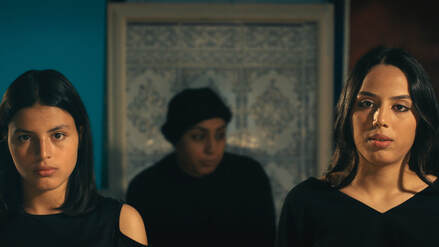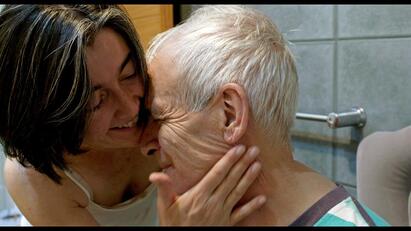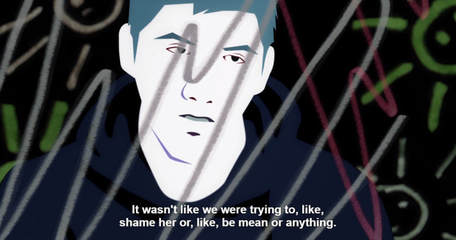A- | A Tunisian family tells their story, aided by two actors who play absent sisters. Directed by Kaouther Ben Hania Review by Jon Kissel |

 Some of the best documentaries of the 21st century have incorporated some kind of meta element into their storytelling. The Act of Killing got its Indonesian government-backed murderers to consider their actions through filmmaking, while The Witness and Tower took innovative approaches towards recreating infamous events from the 1960’s. Dick Johnson is Dead and Procession got their subjects involved in acting out their own fears and traumas, or those of the director. Kaouther Ben Hania’s Four Daughters is in this tradition, breaking up a standard talking head format by casting actors as two of the four titular women. This serves to make the subjects more vulnerable in telling their complicated and affecting story of patriarchy, abuse, and fundamentalism in pre and post revolutionary Tunisia.
0 Comments
 There’s a certain kind of black pilled 20/30-something that I come across on Twitter every so often. It’s not a new phenomenon that unseasonably warm Februaries, ocean temperatures that approach that of a hot tub, and looming environmental catastrophe make people contemplate what the rest of their lives are going to be like. Combined with a difficulty in imagining the big adult milestones of home ownership, marriage, and children, there’s a distinct strain of pessimism in our cohort. In 2021, Bo Burnham received raves for his fatalist lockdown standup special, in which he resignedly sang the lyric ‘20,000 years of this, seven more to go.’ With that kind of built-in mindset, there won’t be movies like The Eternal Memory up for awards at the 2055 Oscars. Having spent their youth contemplating suicide and when it isn’t worth it to continue, everyone who might’ve suffered through Alzheimer’s would have plugged into the euthanasia machine at the first signs.
 The idea that filmmaking is the condensed vision of a single person is probably only true some of the time, if ever. Anyone who’s sat through a credits scroll understands that hundreds of people work on any given film, and those numbers can only classify it as a collaborative medium. However, sometimes a movie gets made that is the perfect distillation of the director’s ego. The version of Dune that had Alejandro Jodorowsky at the helm might have been one of those unfiltered looks into the director’s mind. Jodorowsky strikes me as either a delusional egomaniac or a visionary that could've changed the future of film. In Frank Pavich's documentary Jodorowsky's Dune, the latter is assumed to be true and the former is only implied. While it's impossible to judge something that never happened, Pavich leaves the viewer wishing they could have seen which version of Jodorowsky won out.
 Someone’s going to make a great legal thriller one day about the Satanic Panic, wherein delirious fears of devil worship combined with quack psychology and a gullible justice system to send people to jail on made-up charges. No one’s done it yet on the feature level, though there’s been strong Satanic Panic-adjacent documentaries like the ones about the West Memphis Three. Pre-Hail Satan, director Penny Lane’s first impulse was to make just such a documentary, but the devoted and earnest outcasts of the Satanic Temple caught her attention instead. The resulting effort is perhaps the first evangelizing documentary, or at least the first one that’s ever worked on me. Hail Satan presents such an inspiring vision of countering credulousness and theocracy that I wonder if this is the same feeling morons experience when they babble in pieced-together baby talk, or, as they would say, speak in tongues. Based on the transgressive thrill the film gives me every time someone says Hail Satan, I think the church might’ve just gained a convert.
 In my Lo and Behold review, I wasn’t a fan of the predictable spot that Werner Herzog landed on. There was a solid chunk of that film that pooh-poohed technology, a generally boring take for even someone as engaging as Herzog. He’s not quite curmudgeonly, wondering what’s wrong with kids these days, but there’s an air of it, particularly when Lo and Behold tiptoes up to gaming. He would likely shake his head in wonderment at Audrie and Daisy, observing how the Internet serves here as a tool that magnifies and enables bad behavior, of which teenage boys are eager to dive into headfirst. These are tragic stories of isolation and ostracization, where the Internet makes the world smaller and more insular instead of the opposite ideal that the founders and inventors, whom Herzog interviewed, intended. |
AuthorsJUST SOME IDIOTS GIVING SURPRISINGLY AVERAGE MOVIE REVIEWS. Categories
All
Archives
April 2023
Click to set custom HTML
|